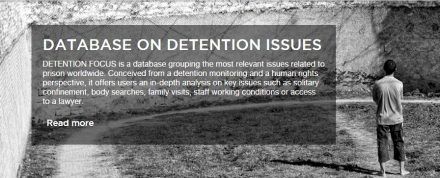Introducing a valuable new tool for detention monitors
22nd April 2015

The Association for the Prevention of Torture has recently launched a new database of international and regional standards, information, guidance and helpful tips to assist prison monitors as well as prison authorities and others engaged both in running and observing prisons. Here, APT’s Detention Advisor, Jean-Sébastien Blanc, explains why this resource is needed and what it offers for detention monitoring.
Prisons have always been challenging environments – those who are locked in know it too well. But prison systems are becoming more complex for those who work in penal institutions or try to influence prison policies from the outside. More transparency, more rights, more norms, new technologies, higher professional standards… All this aims to make prison a safer and better place. At the same time, and with the emergence of new challenges, advocating for penal reforms and respect for detainees’ rights become all the more complicated. Institutions monitoring places of detention may easily be overwhelmed by the enormity of the task. Where to start? What to look at? Who needs particular protection in prison?
To answer these questions, and therefore to assist and ease the work of monitoring bodies as well as detaining authorities, the Association for the Prevention of Torture (APT) created the Detention Focus database. This brand new resource assembles the most critical issues one may find in prisons, ranging from access to a lawyer and food, to body searches and access to health. Each of the issues is accompanied by an analysis based on prison realities in a broad variety of contexts, and by relevant international standards.
The development of international standards has greatly improved the protection of detainees, in particular those belonging to minorities and vulnerable groups. There is now much more awareness of the special needs of and hence additional protections required for specific individuals, especially when they are deprived of their liberty. This has been mainly possible thanks to the tireless efforts of civil society, such as the work PRI has been doing on female detainees. Detention Focus clearly emphasizes the special protection and attention that should be brought to detainees in vulnerable situations. It provides the possibility to instantly combine the search on an issue with a specific group. With a few clicks users can easily find out very specific information, such as what should be the basic protection standards for LGBTI persons facing inter-detainee violence, what are the rights of foreigners looking for consular support, or how can minorities and indigenous people freely exercise their religion.
Detention Focus has been thought primarily for institutions in charge of monitoring prisons. In addition to in-depth analysis and compilation of international and regional standards, the database therefore offers practical questions that can serve as guidance and tips. This will help facilitate the preparation for a visit (defining priorities and anticipating issues), but also the conduct itself (bringing along easily downloadable checklists) and the drafting of reports and recommendations (substantiating the findings with standards).
Despite its special target on monitoring bodies, Detention Focus will also be of interest to a wider audience: professionals working in prison environment, lawyers, detainees’ relatives, civil society organisations, academics and any person with an interest in deprivation of liberty. Detention Focus is a living tool; as such it will evolve and get enriched by new standards and issues as time goes by. To help us improve it, your feedback is warmly welcome. Detention Focus is currently available in English, a French version will be launched in a couple of months and we are looking for additional funds to make it available in Spanish. Now, simply take a look yourself!